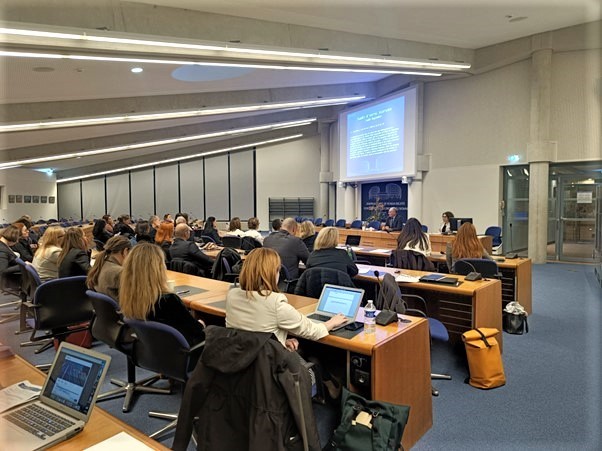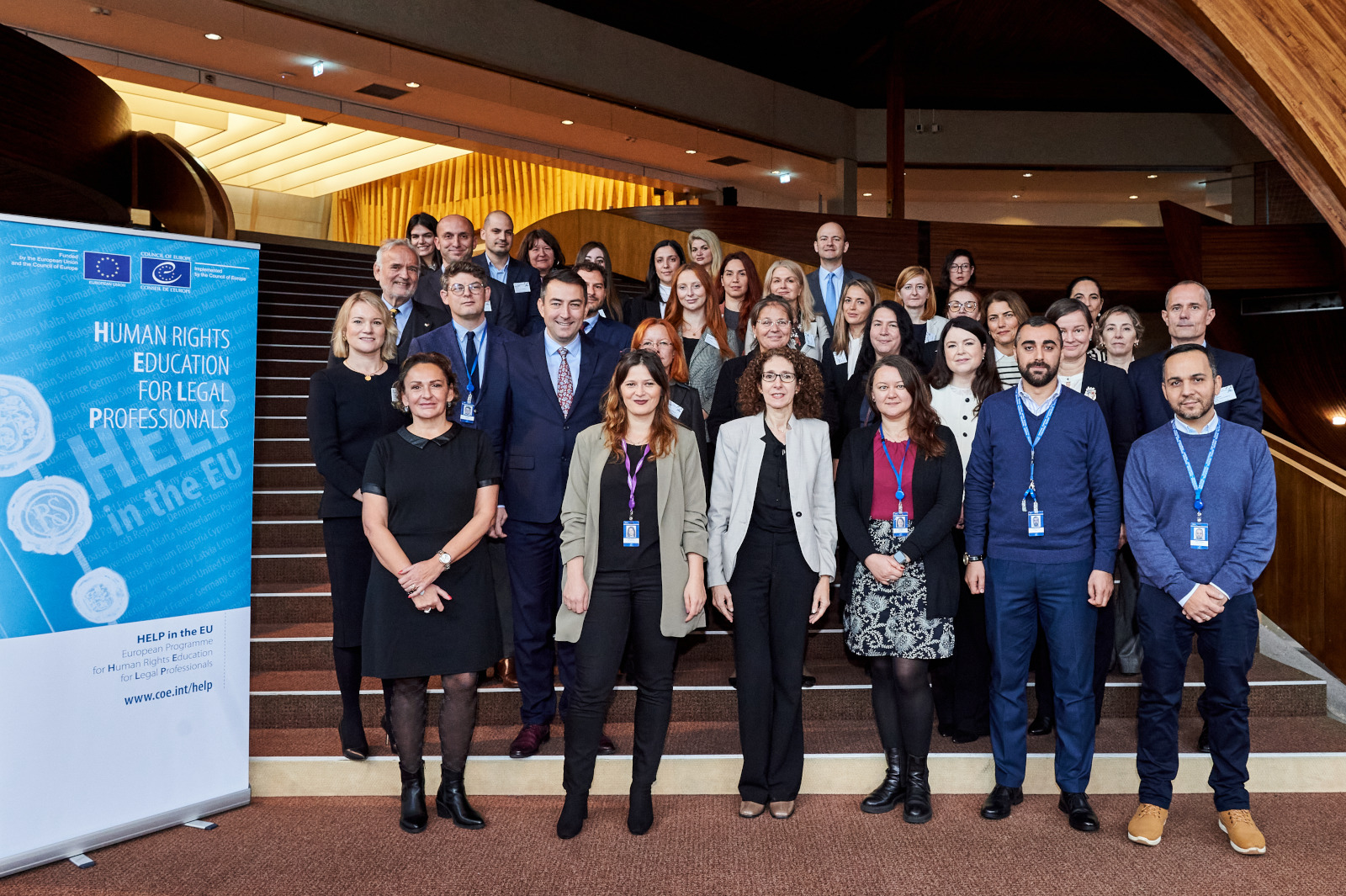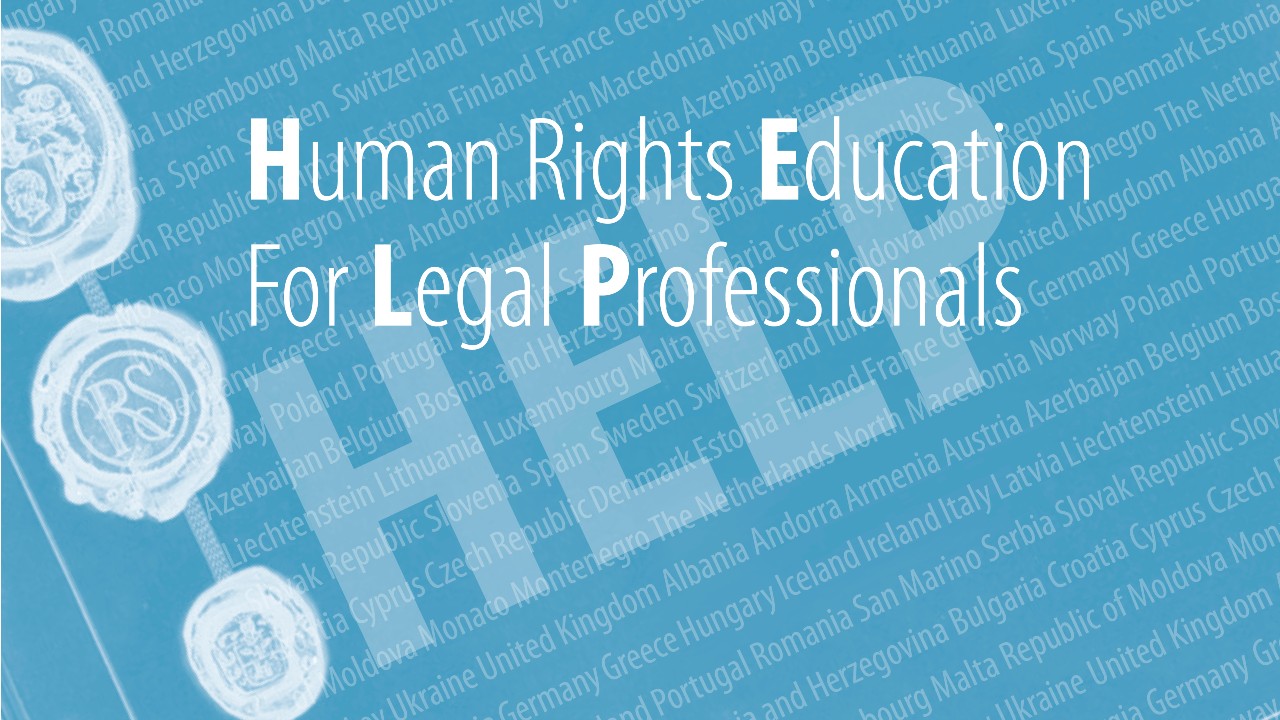On 13 and 14 November 2023, forty judges, prosecutors and lawyers from sixteen EU Member States attended the launch of the Council of Europe HELP course on Introduction to Human Rights Protection in Europe – the Interplay between the ECHR and the EU Charter of Fundamental Rights.
The event was held at the premises of the Council of Europe in Strasbourg, France. It was organised by the Council of Europe in the framework of the EU-CoE Project “HELP in the EU III” (funded under the European Union’s Justice Programme (2021-2027)).
The launch began with introductory remarks from Eva Pastrana, Head of the Justice and Human Rights Training Division of the Council of Europe. She talked about how important it is for her Division to provide and promote the training of legal professionals across Europe and beyond on human rights protection instruments. She emphasized that, while the main focus is on those instruments stemming from the Council of Europe (CoE), their intertwinement with EU laws and policies has also been an integral part of the plan of action since 2015.
Several interventions relevant for the topic of the course followed. Răzvan Horațiu Radu started; he is a former Government Agent before the European Court of Human Rights (2007-2011) and before the Court of Justice of the European Union (2011-2018), currently a prosecutor in Romania. He discusses differences and similarities in appearing and arguing before the two European courts, providing examples of particular situations and case-law and looking at challenges and opportunities.
David Milner, Head of the Human Rights Intergovernmental Co-operation Division of the Council of Europe talked about the EU accession to the European Convention on Human Rights (ECHR). He provided information on the context of the negotiations, and the work of the “46+1“ Group, the outcome of the recent negotiations, and the propspects for conclusion of the accession process. Martina Törnkvist, Team leader in the Charter Team of the Directorate-General for Justice and Consumers of the European Commission, dealt with the work of the European Commission in the field of fundamental rights and the synergies between the EU Charter and the ECHR. She also mentioned online resources existing at the level of the EU, such as the European Training Platform.
Gabriel Toggenburg from the European Union Agency for Fundamental Rights (FRA) emphasized the success of the long-standing cooperation of FRA and CoE. He also introduced the EU Fundamental Rights Information System, with a specific focus on Charterpedia, FRA’s encyclopaedia on the EU Charter.
The European Court of Human Rights (ECtHR) and the Court of Justice of the European Union (CJEU) were also represented at the event. Johan Callewaert, Deputy Grand Chamber Registrar at the European Court of Human Rights, argued that EU law and the ECHR operate as sources of mutual inspiration and examined specific case law from both the Strasbourg and the Luxembourg Court; he touched upon their approach on matters such as the execution of European arrest warrants, international child abduction and the Dublin Regulation.
Roland Klages, Référendaire in the Chambers of the First Advocate General at the Court of Justice of the European Union, discussed preliminary ruling requests coming from national courts. He delved into the functioning of the CJEU and its procedures, comparing them with those of the ECtHR. He also touched upon specific examples and expressed trust in a continuous judicial dialogue between Strasbourg and Luxembourg.
Participants also carried out a visit to the European Court of Human Rights, where they were welcomed by Loredana Cristea and Reniz Zaganjori, Lawyers with the Registry of the European Court of Human Rights. They learned about the functioning of the Court, the journey of the applications submitted before it, as well about the procedural requirements to respect. They also discussed about the case-law related resources made available by the Court in the field of the environment and human rights and were given an introduction to the Court’s Knowledge-Sharing Platform.
During the launch event, the participants also got acquainted with the HELP programme and its e-learning platform, which offers 49 courses on human rights. Furthermore, the group met its HELP tutors, Raluca Bercea, international expert, lawyer and Professor of Law in Romania and Deirdre O’Gara, Advisory Council at the Office of the Attorney General of Ireland. They talked to the participants about their background and interests and presented some insights into the matters to be approached during the course.
The tutors will provide the participants with support and guidance during the following weeks. During the launch event, all participants have been registered on the dedicated course page and are now ready to start the tutored course. HELP certificates, issued by the Council of Europe, will be awarded to those who successfully complete the course.
******************************************
The HELP course on Introduction to Human Rights Protection in Europe – the Interplay between the ECHR and the EU Charter of Fundamental Rights emphasizes that EU legal and justice professionals involved in protecting human rights need to understand the European setting in terms of standards and applicability of the two main systems in place, namely under the Council of Europe, with the European Convention on Human Rights and the European Social Charter, and under the European Union, with the EU Charter of Fundamental Rights and the relevant EU law.
The two European systems and their mechanisms have substantially evolved towards convergence and interplay and the two European Courts – the European Court of Human Rights (ECtHR) and the Court of Justice of the EU (CJEU) - are actively engaged in a judicial dialogue and draw inspiration from each other. Moreover, the future accession of the EU to the ECHR (currently under negotiation) will come as an accomplishment to the efforts carried over the years to ensuring a thorough and effective human rights protection system in Europe.
The course is primarily addressed at legal/justice professionals (judges, prosecutors, lawyers, court staff), but could also be extremely beneficial to bailiffs, notaries, mediators, legal interpreters and translators, court experts etc. It can also be useful for the training of policymakers, national human rights institutions, as well as civil society organisations, university students, EU/CoE staff or anybody interested on the topic.
This HELP course was developed in 2023 under the EU-CoE HELP in the EU III Project (funded under the European Union’s Justice Programme (2021-2027)). The topics are explored in a practical way by using presentations, interactive screens, knowledge tests and reflective exercises, enabling the users to apply the gained knowledge and skills.
The course is available in self-learning format, which has a duration of 6 hours. While for now it can only be followed in English, translation in several other EU languages is in progress. Upon completion, users can generate their electronic Statements of Accomplishment, in proof of their acquired knowledge and skills.
HELP courses are intended, in the long term, to become an integral part of the overall learning curricula of the national training institutions and/or other competent authorities of the CoE member states and beyond.







